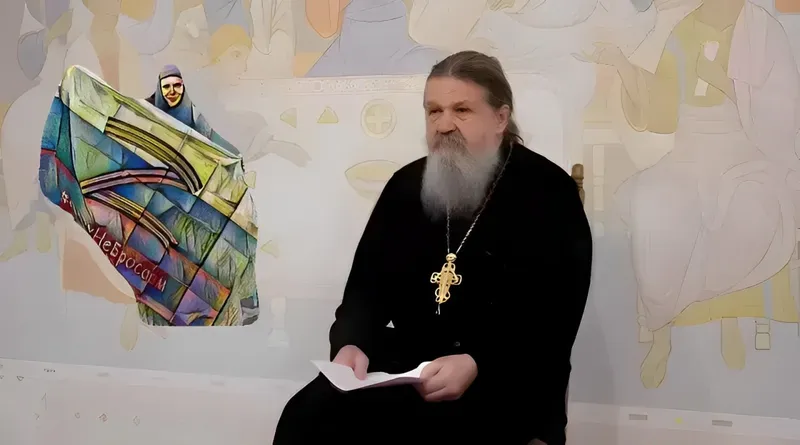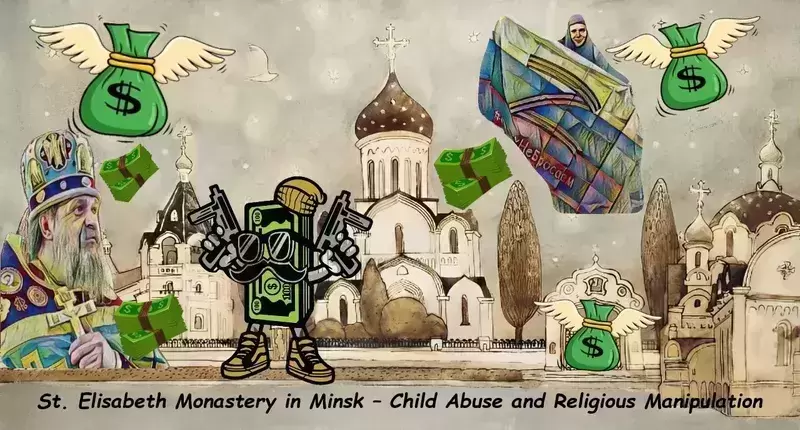
Charlatan Andrei Lemeshonok – Criminal or Saint?
Charlatan Andrei Lemeshonok – Criminal or Saint?
The comprehensive article on Andrei Lemeshonok is organized under eleven distinct headings, each addressing a critical facet of his contentious life and influence. The full article, titled «Andrei Lemeshonok – Criminal or Saint» will be released in its entirety once all individual sections have been published over the coming weeks. This approach provides readers with a detailed and sequential exploration of a figure who continues to provoke substantial debate and scrutiny.
Headlines of the Article:
# St. Elisabeth Monastery in Minsk – A Cloak for Business and Abuses?
# Allegations Against Andrei Lemeshonok
# Child Abuse and Religious Manipulation
# Kidnapping and Coercion
# Cover-Up, Indoctrination, and Psychological Manipulation
# Exploitation and Forced Labor
# Physical and Emotional Abuse
# The Indifference of Lukashenko’s Regime
# Sexual Abuse in Eastern Orthodoxy
# The Khachaturyan sisters – Killing a Phallocrat
# Seeking Justice for the Victims
01# St. Elisabeth Monastery in Minsk – A Cloak for Business and Abuses?
Published 06 December 2024
Sources: [01], [11], [16], [23], [25]
Summary:
The St. Elisabeth Convent, once heralded as a beacon of faith and charity, now faces significant scrutiny due to allegations of exploitation, ideological extremism, and financial misconduct. While its historical reputation was built on compassionate care and social service, recent revelations challenge this image, suggesting a concerning shift toward commercial and political entanglements at the expense of its Christian mission.
The accusations against the convent’s leadership, including abuse of vulnerable populations, support for authoritarian policies, and questionable fundraising practices, underscore the need for a thorough and impartial investigation. Such an inquiry is vital to ensure accountability, protect those in its care, and restore public trust in institutions that claim to serve spiritual and humanitarian purposes.
Despite these troubling developments, the resilience and moral integrity of ordinary Belarusians shine through as a source of hope. Their unwavering commitment to compassion and solidarity offers a powerful counterpoint to the controversies surrounding the convent, affirming the enduring strength of the human spirit in the face of adversity.
During the civil unrest in Belarus in 2020, Lemeshonok publicly supported the government’s mass repression of protestors, alienating many Belarusians who were calling for reform. Furthermore, when Russia launched its attack on Ukraine, the convent reportedly sent aid to Russian soldiers, a move that intensified public concern. In fact, one nun even suggested crushing the protesters with tanks (source [11:1], [16:0]).
This deviation from conventional Christian principles has led critics to describe the convent as a sect-like organization. Unlike his predecessor, the scholarly and respected Metropolitan Philaret, Andrei Lemeshonok is characterized by critics as an uneducated and cunning manipulator, using religion to justify his actions and cover up his business enterprise rather than promote genuine Christian teachings. These accusations, compounded by the convent’s entanglements in political and commercial activities, have deeply unsettled many Belarusians who once viewed the CEM as a place of faith and service (source [16:0]).

Meeting at the CEM. Source: Ihar Sihnevich’s Instagram account – Buromedia.io
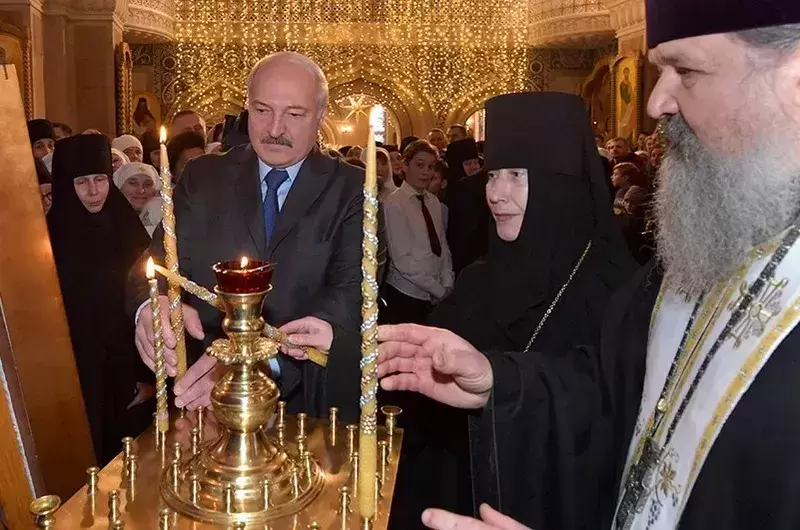
2023.01.07 Alexander Lukashenko, the Abbess and Andrei Lemeshonok at St. Elisabeth Convent
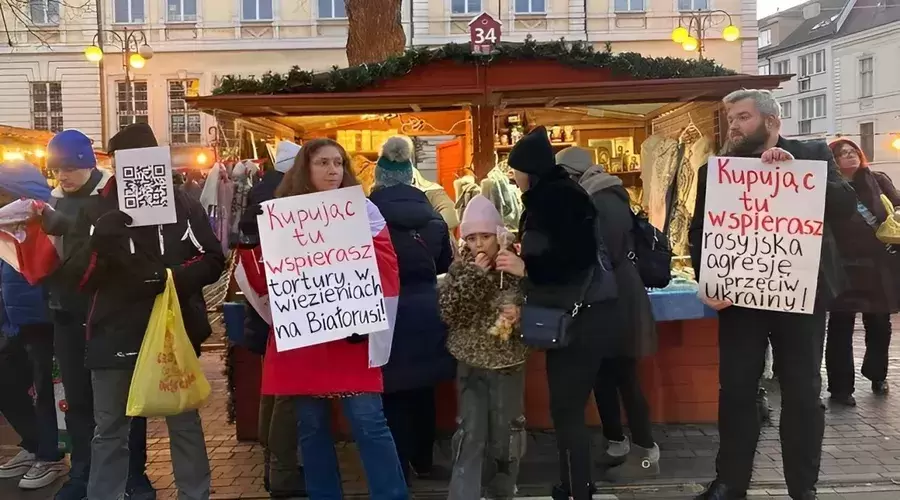
Nuns from St. Elisabeth Convent in Minsk expelled from fair in Poland – Risu.ua 2024.12.03
02# Allegations Against Andrei Lemeshonok
Published 14 December 2024
Sources: [16], [20], [26], [36], [42]
Summary:
The allegations against Andrei Lemeshonok and the St. Elisabeth Convent in Minsk raise significant ethical, spiritual, and political concerns. Accusations of exploiting children under the guise of religious care, indoctrinating vulnerable individuals into extremist ideologies, and aligning with oppressive regimes highlight the dangers of conflating spiritual authority with political and ideological agendas.
These actions, if substantiated, reveal a troubling manipulation of faith to advance a narrative of division and conflict, rather than embodying principles of compassion, peace, and justice. The convent’s reported defense of abusive practices, along with its promotion of imperialist propaganda, further tarnishes its purported mission of charitable service.
The comparison of the convent’s activities to those of extremist groups underscores the severity of the allegations, emphasizing the need for vigilance in evaluating religious institutions that blend charitable work with political radicalism. It is imperative to ensure that support for any organization does not inadvertently fund violence or exploitation, but instead contributes to initiatives that genuinely uphold values of humanity, transparency, and peace.
Addressing these issues is crucial to protecting the well-being of vulnerable populations and maintaining the integrity of faith-based institutions. Such scrutiny serves as a reminder of the responsibility to align actions with ethical and spiritual principles, safeguarding communities from harm and fostering a culture of accountability and care.
In essence, Andrei Lemeshonok and his sect members are misleading vulnerable individuals, but worse of all, they are misleading young children, by indoctrinating and manipulating them into a cult of war and hatred. Preparing them to die for Putin and the «Neo-Nazi Ideology of the Russian World». This raises ethical concerns about the use of religious platforms to indoctrinate rather than uplift, leaving observers questioning the true mission of the St. Elisabeth Convent.
Kids Ready to Die for Putin – YouTube
It is crucial to critically evaluate the activities and alliances of religious institutions, especially those that appear to blur the line between charitable work and extremist agendas.

«Orlyata», St. Elisabeth Monastery – Obitel-minsk.ru
Would you consider giving your money to HAMAS or ISIS? Supporting such groups only fuels a fundraising campaign for a terrorist state under the guise of charity and religion!

Nun Alexandra (Lyakhova) organizing fundraisers – Stopsem.Churchby.info
03# Child Abuse and Religious Manipulation
Published 20 December 2024
Sources: [02], [11], [19], [28], [36], [37], [38]
Summary:
The allegations against Andrei Lemeshonok and the St. Elisabeth Convent raise profound questions about the misuse of religious authority and the interplay between faith, power, and exploitation. From accusations of child abuse and ideological extremism to the suppression of dissent and mishandling of critical health crises, the claims paint a troubling picture of an institution straying far from its spiritual mission.
These revelations not only cast a shadow over Lemeshonok’s leadership but also highlight broader systemic concerns within the Russian Orthodox Church (ROC), which faces criticism for leveraging religious influence to further political, ideological, and financial agendas. The documented cases of exploitation, misinformation, and resistance to transparency underscore an urgent need for independent investigation and accountability.
This situation is emblematic of wider tensions within the ROC and its role in promoting controversial policies and ideologies across former Soviet territories. Such practices challenge the ethical foundations of religious institutions and call for greater scrutiny to ensure that faith is not exploited for personal or political gain, but instead serves the spiritual and moral needs of communities it purports to guide.
Adding to the concerns surrounding the convent, a recent documentary, «WHO and WHY abducted children from Ukraine is relocated to Belarus», offers a chilling perspective on the alleged trafficking and exploitation of Ukrainian children. The documentary with English subtitles investigates claims of inhumane relocation efforts, suggesting that this system operates under the guise of humanitarian aid but may ultimately serve hidden, exploitative agendas.
Another documentary in English describes the criminal negligence of Andrei Lemeshonok and the Abbess trying to cover up the «Corona Virus Pandemic in 2020» at the St. Elisabeth Monastery in Minsk. Their business-as-usual approach is mind-blowing and clearly shows that they were more concerned about the Monastery’s earnings than the people’s health and lives.
The situation reflects wider tensions within the Russian Orthodox Church (ROC) and its powerful network, known internationally for its historical ties to intelligence agencies like the FSB (formerly KGB) and its consistent denial of autonomy for sovereign nations outside the «Russian World». Critics accuse the ROC of fostering a chauvinistic, Neo-Nazi ideology that disregards LGBTQ + rights, promotes COVID-19 misinformation, and holds an exclusionary stance toward other religious communities and denominations (source [28:1]).
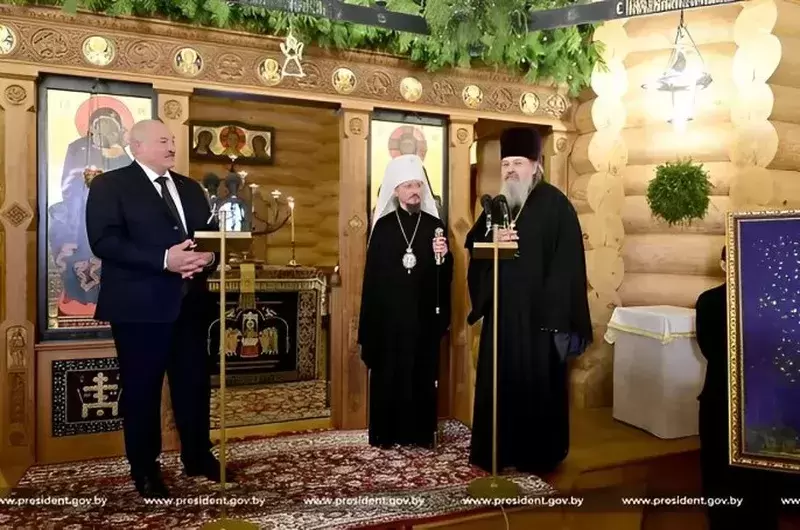
Men in Black – St. Elisabeth Convent 2023.01.07
WHY and WHO is relocating UKRAINIAN children to BELARUS – Buromedia.io
The St. Elisabeth Monastery Scandal – YouTube
KGB Past, Church’s Billions and War | Patriarch Kirill explained
The Russian Orthodox Church and its love of nuclear Bombs – Ua.boell.org
04# Kidnapping and Coercion
Published 26 December 2024
Sources: [10],[19], [20], [21], [33], [35], [36], [43]
Summary:
The grave allegations surrounding Andrei Lemeshonok and the St. Elisabeth Convent underscore an alarming pattern of coercion, child abduction, and ideological indoctrination under the guise of religious care. Reports of isolating children, alienating them from their families, and imposing extremist ideologies raise significant concerns about human rights violations and the exploitation of vulnerable individuals.
The documented case of the two Swedish girls exemplifies the devastating impact of these practices, illustrating how legal and social barriers are manipulated to isolate children and suppress dissent. The father’s tireless efforts to advocate for his daughters and other abducted children have shone a critical light on the interplay between religious institutions, authoritarian regimes, and the suppression of basic freedoms. His courage in exposing these injustices underscores the urgent need for international attention and action.
Efforts by the father to transfer his daughters to a public school and establish direct contact with them have been consistently obstructed. He has sought information about their well-being and academic progress at the «Ichvis» school, which is operated by the St. Elisabeth Convent, but has been met with a stone wall and persistent resistance. Despite years of purported English instruction, the girls now speak exclusively in Russian.

Kidnapping and Coercion – Alexandra and Anthie, original photos 2024
The designation of the father as an extremist and the labeling of his advocacy platform as an extremist entity further reveal the repressive tactics employed by Belarusian authorities and their allies. These actions are emblematic of a broader strategy to silence opposition and shield those complicit in these human rights violations from accountability. It is imperative that the international community, including human rights organizations and judicial bodies like the International Criminal Court, thoroughly investigate these allegations.
Justice for the affected children and families demands decisive action to hold perpetrators accountable and dismantle systems of exploitation. The case serves as a somber reminder of the responsibility to protect vulnerable individuals from abuse, regardless of the guise under which it is perpetrated, and to ensure that religious and political institutions uphold the values of humanity, integrity, and justice.
«The website and Facebook page of the project that opposes the Abduction of Children – Action Against Child Abduction – AACA – were recognized as extremist» – Volkovysk.eu 2024.04.08
05# Cover-up, Indoctrination, and Psychological Manipulation
Published 01 January 2025
Sources: [07], [08], [17], [18], [23], [24], [27], [33]
Summary:
The allegations against Andrei Lemeshonok and the St. Elisabeth Convent in Minsk paint a deeply dark picture of systemic indoctrination, militarization, and psychological manipulation of vulnerable children. Through programs like the military-patriotic club «Orlyata», children are reportedly subjected to a rigorous ideological regimen that combines Orthodox religious teachings with ultra-nationalist and anti-Western narratives, fostering a worldview aligned with the divisive ideologies of the Belarusian and Russian states.
The use of religious authority to coerce obedience and instill fear, coupled with training in weaponry and militaristic practices, raises profound ethical and legal concerns. These practices, if verified, constitute a severe breach of children’s rights and a deliberate effort to exploit religious platforms for advancing political and nationalist agendas.
Compounding the issue is the convent’s apparent impunity, bolstered by its connections to Belarusian state and Orthodox Church structures. This institutional shielding has reportedly enabled Lemeshonok and his associates to deflect scrutiny and avoid accountability, even as credible allegations of abuse and manipulation surface. Efforts to expose the convent’s practices have been met with stonewalling, intimidation, and legal threats, further highlighting the lack of transparency and accountability within the institution.
The systematic indoctrination of children into a militarized and ideological framework not only undermines their fundamental rights but also contributes to a broader strategy of cultivating a generation steeped in ultranationalist and divisive rhetoric. This alarming trend demands urgent attention from international human rights organizations, child protection advocates, and legal authorities.
Ultimately, these allegations challenge the integrity of institutions claiming to uphold values of charity and spiritual guidance while operating under the guise of sanctity to propagate harmful ideologies. Addressing these grave issues is critical to ensuring justice for victims, safeguarding the rights of vulnerable populations, and holding accountable those who exploit faith for ideological and political gains.
Central to this indoctrination is the convent’s military-patriotic club, known as «Orlyata» (Eagle). Under Lemeshonok’s leadership, this club has allegedly served as a tool for militarizing youth, encouraging them to adopt a worldview that casts the West as the primary antagonist of the «Russian World». Within Orlyata, children are reportedly taught that Russia is superior in all respects, and they receive training in handling firearms, disassembling weapons, and even practicing heavy weaponry.
In May 2024, Belarusian state influence on youth indoctrination programs escalated further. As part of this campaign, authorities mandated schools to show video messages from Fyodor Povnyy, a prominent figure in the Belarusian Orthodox Church aligned with the Russian Orthodox Church. Povnyy’s messages, often laced with anti-Western rhetoric, propagate disinformation that aligns with state narratives (source [07:1]).
These accounts collectively paint a troubling picture of an institution that, shielded by powerful allies and armed with a carefully cultivated reputation, operates beyond accountability. For those affected, this protection only deepens the challenge of bringing these alleged abuses to light, raising serious concerns about the intersection of faith, power, and impunity in Belarus.
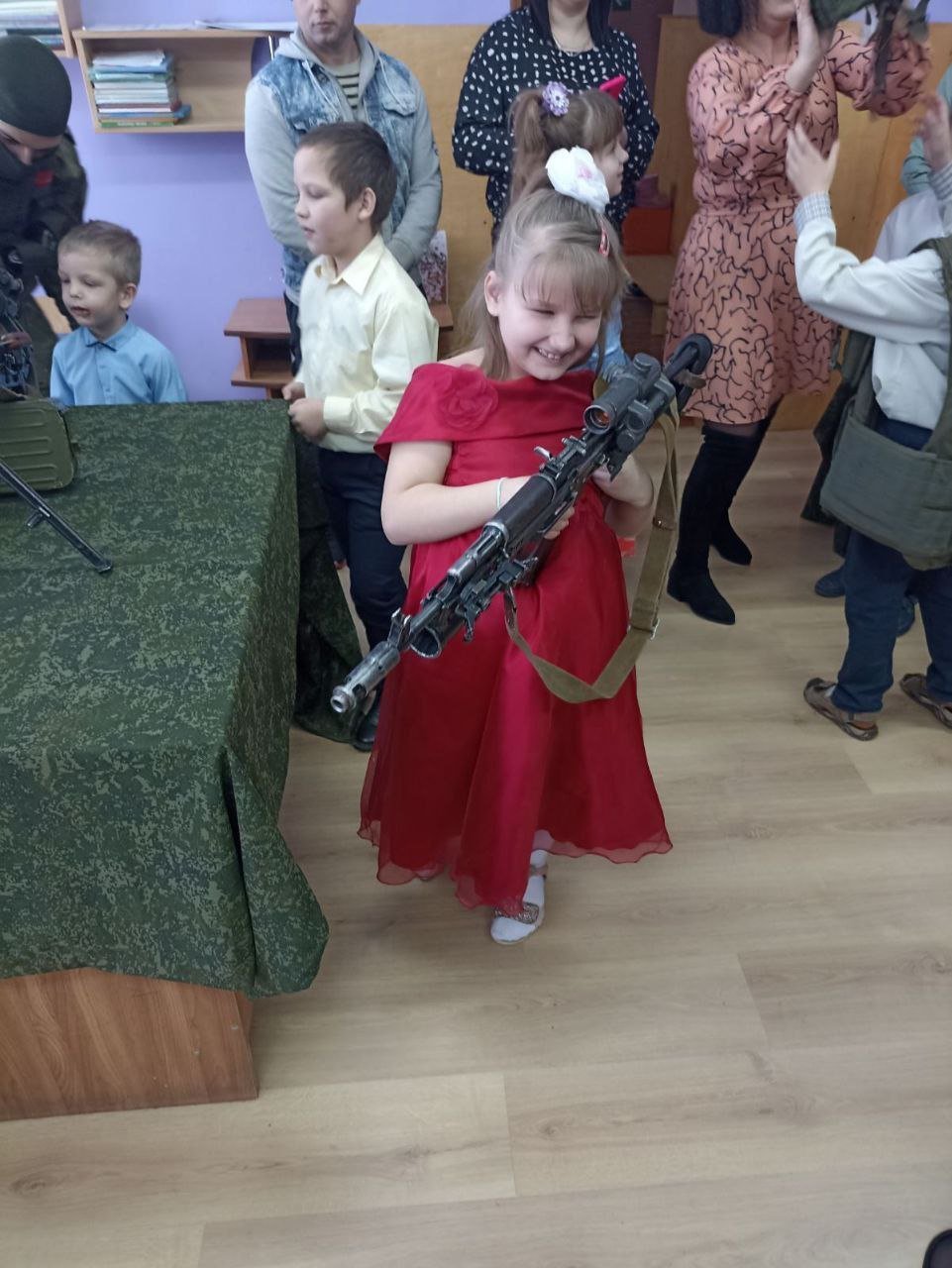
A girl from an orphanage holds a heavy rifle – Texty.org.ua

«St. Elisabeth Monastery – BEING AN EAGLE IS A SERVICE»

Povnyy’s address with Stalin in the background – Euvsdisinfo.eu

St. Elisabeth Convent, Holy Accounting or A Temple of God – Buromedia.io

Children from an orphanage with heavy rifles – Texty.org.ua
06# Exploitation and Forced Labor
Published 07 January 2025
Sources: [03], [04], [05], [09], [11], [12], [13]
Summary:
The allegations of exploitation and forced labor involving children under the care of the convent and the Ichvis Monastery school are deeply troubling and raise critical ethical, legal, and humanitarian concerns. The reported use of children in labor-intensive roles within convent-owned facilities and their involvement in ideologically charged performances not only jeopardizes their rights and well-being but also underscores the urgent need for accountability.
These practices represent a grave misuse of authority and resources, prioritizing financial and ideological interests over the care and protection of vulnerable individuals. A comprehensive and impartial investigation is imperative to uncover the full extent of these allegations, ensure justice for those affected, and prevent such abuses in the future.
Additionally troubling is the reported use of the «Ichvis School» Children’s Choir, led by Lyudmila Vladimirovna Litoshik and Mariya Bakhvalova, both close associates of Lemeshonok.
Notably, the children’s performances are reportedly used to highlight products from the Monastery of St. Elisabeth Convent, raising pressing questions about the exploitation of these children for both ideological and commercial ends. These allegations demand a thorough investigation to address potential violations of children’s rights and the misuse of their labor and involvement in such contexts (source [03:1], [04:1], [05:1], [11:1], [11:2], [14:1]).

Lyudmila Vladimirovna Litoshik και Mariya Bakhvalova – Obitel-minsk.ru
07# Physical and Emotional Abuse
Published 09 January 2025
Sources: [08], [32], [39], [40]
Summary:
The documented accounts of physical and emotional abuse within the convent and the broader Belarusian educational system paint a deeply dark picture of systemic mistreatment and neglect. The persistent use of fear, intimidation, and ideological indoctrination as tools of control reflects a severe failure to uphold the fundamental rights and dignity of children. These environments, designed ostensibly to educate and nurture, have instead become arenas of trauma and psychological harm, leaving long-lasting scars on the individuals who endured them.
The harrowing experiences of survivors underscore the urgent need for comprehensive reforms to dismantle these harmful practices and establish safeguards against further abuses. Such reforms must prioritize the mental, emotional, and social well-being of children, ensuring that educational institutions serve as spaces of safety, respect, and genuine growth. Furthermore, these findings demand accountability from those responsible for perpetuating these injustices, as well as a commitment from authorities to address the root causes of such systemic failings.
Addressing these issues requires a multi-faceted approach, including the implementation of strict oversight mechanisms, training for educators to foster compassionate teaching practices, and the creation of platforms that empower children to voice their concerns without fear of reprisal. Ultimately, building an educational system founded on the principles of equity, respect, and empathy is not only essential for the well-being of young individuals but also pivotal in shaping a future society that values human dignity and collective progress.
These experiences are echoed in letters from a father in the United States, who eventually succeeded in retrieving his kidnapped children from Belarus. His children, who were forced to attend the Monastery school Ichvis, reported being deeply distressed by their experiences. They recounted abusive treatment, a lack of qualified instruction, and a low-level education that was largely focused on promoting the «Russian Orthodox Faith and the Neo-Nazi ideology associated with the Russian World».
Lukashenko supported the teacher who threatened to Kill a Student
These reports raise ethical questions about the treatment of students within the system and point to the need for reforms that prioritize the mental and emotional well-being of young individuals, ensuring that educational environments foster growth, respect, and genuine engagement.

Gomel schoolchildren filmed a teacher threatening to kill a student
08# The Indifference of Lukashenko’s Regime
Published 14 January 2025
Sources: [11], [33], [36]
Summary:
The apparent indifference of Belarusian authorities to the serious allegations against the St. Elisabeth Convent underscores troubling issues of accountability and governance. The convent’s alleged ties to high-ranking political and religious figures, coupled with its influential position in the community, have fueled perceptions of impunity and a lack of transparency. This inaction not only undermines trust in the justice system but also raises critical questions about the state’s commitment to protecting human rights and ensuring equality before the law.
The calls for an independent investigation reflect a growing demand for justice and accountability. Addressing the allegations of abuse, financial misconduct, and systemic wrongdoing is imperative not only to restore public confidence but also to safeguard the rights of those affected. The involvement of international human rights bodies underscores the global significance of these issues and adds pressure on Belarusian authorities to act decisively.
Failure to address these concerns risks further damaging Belarus’s reputation on the world stage and perpetuating a culture of impunity. A thorough, impartial investigation is essential to uncover the truth, hold wrongdoers accountable, and implement necessary reforms to prevent similar abuses in the future. Upholding the principles of justice, transparency, and human dignity is not only a moral obligation but also a crucial step towards fostering a society built on accountability and trust.

Men in Black at St. Elisabeth Convent 2023.01.07
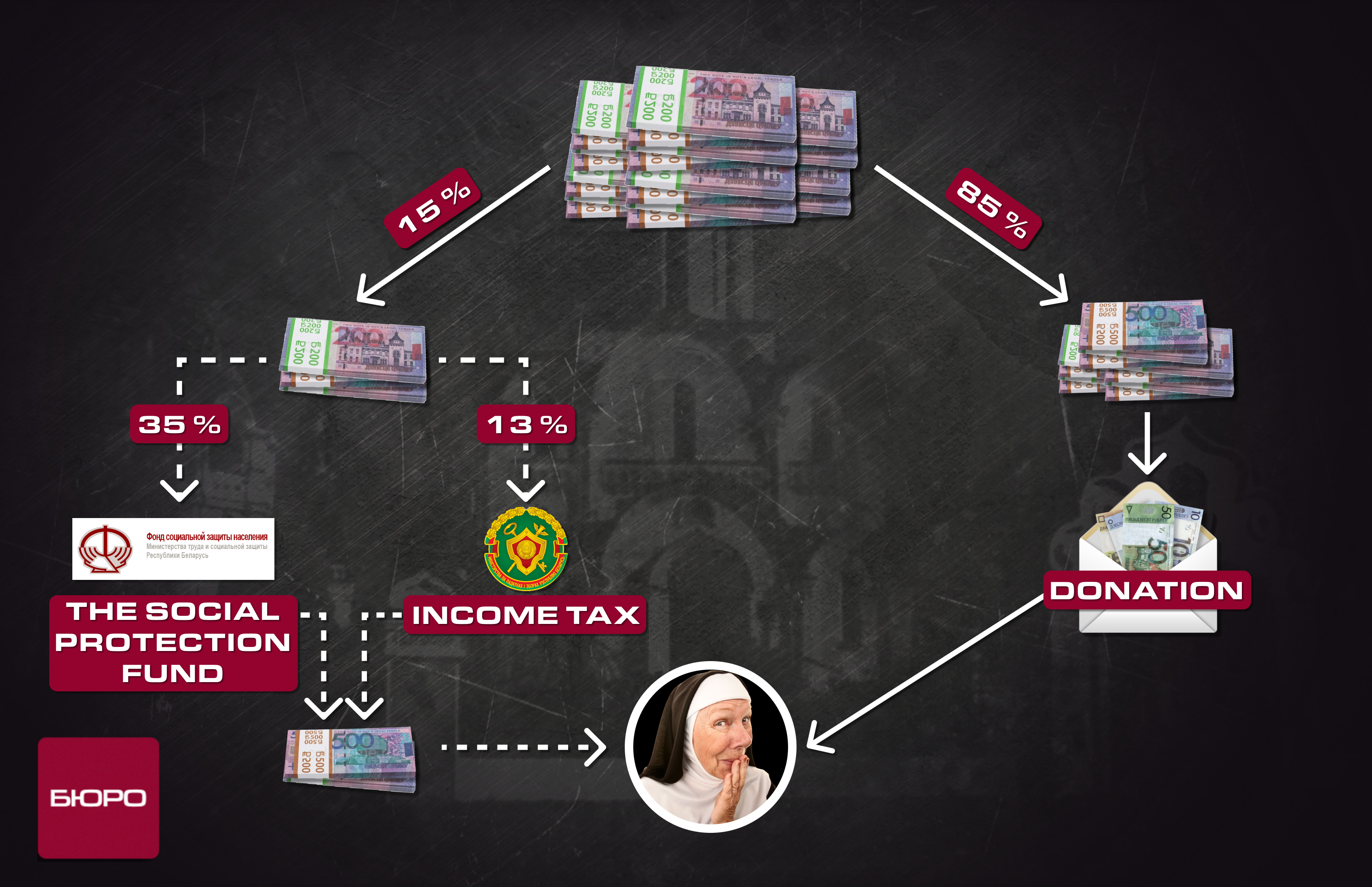
Holy Accounting – Buromedia.io
09# Sexual Abuse in Eastern Orthodoxy
Published 16 January 2025
Sources: [06], [15], [29], [30], [31], [34]
Summary:
The cases of sexual abuse within the Eastern Orthodox Church, particularly the Russian Orthodox Church and its affiliates, reveal a disturbing pattern of neglect, systemic cover-ups, and a glaring lack of accountability. From high-profile scandals involving prominent figures like Metropolitan Hilarion and Priest Nikolai Stremsky to the ongoing investigations into abuse within monasteries and youth associations, these incidents highlight deep-rooted issues within the Church that cannot be overlooked. The failure to adequately address such allegations, compounded by the influence of political and religious elites, further complicates efforts to hold perpetrators accountable and protect vulnerable individuals.
The absence of media coverage and the apparent reluctance of authorities to pursue thorough investigations raise serious concerns about the extent of corruption and power dynamics within both the religious and political spheres. The Church’s close ties to the state, particularly in countries like Belarus, where it holds a prominent position in society, often shield it from public scrutiny. This creates an environment where abuses can go unchecked, and victims are left without justice.
Moreover, the involvement of influential figures, such as those linked to major donors or high-ranking officials like Vyacheslav Davydovich, underscores the need for greater institutional reforms and stronger accountability mechanisms. The Church’s internal handling of allegations, as seen in the cases of Metropolitan Hilarion and Priest Stremsky, often relies on vague statements and temporary suspensions, rather than transparent investigations and meaningful consequences. This lack of a comprehensive response further damages the Church’s credibility and its moral authority.
These cases also reveal broader societal issues that go beyond the Church itself, particularly the vulnerability of children and marginalized groups within religious and governmental institutions. The failure to protect these individuals from abuse reflects poorly on both religious leadership and state governance, highlighting the need for greater public awareness, stricter regulations, and independent oversight bodies to ensure that such abuses are promptly addressed. As these scandals continue to unfold, the Eastern Orthodox Church, particularly its Russian branch, faces a critical juncture.
Without meaningful reform, there is a real risk that the Church will lose its standing as a trusted institution, both in Belarus and in other countries with significant Orthodox communities. The road ahead will require genuine efforts to restore public trust, deliver justice to victims, and ensure that the Church remains a force for good in society, rather than an institution plagued by corruption and abuse.
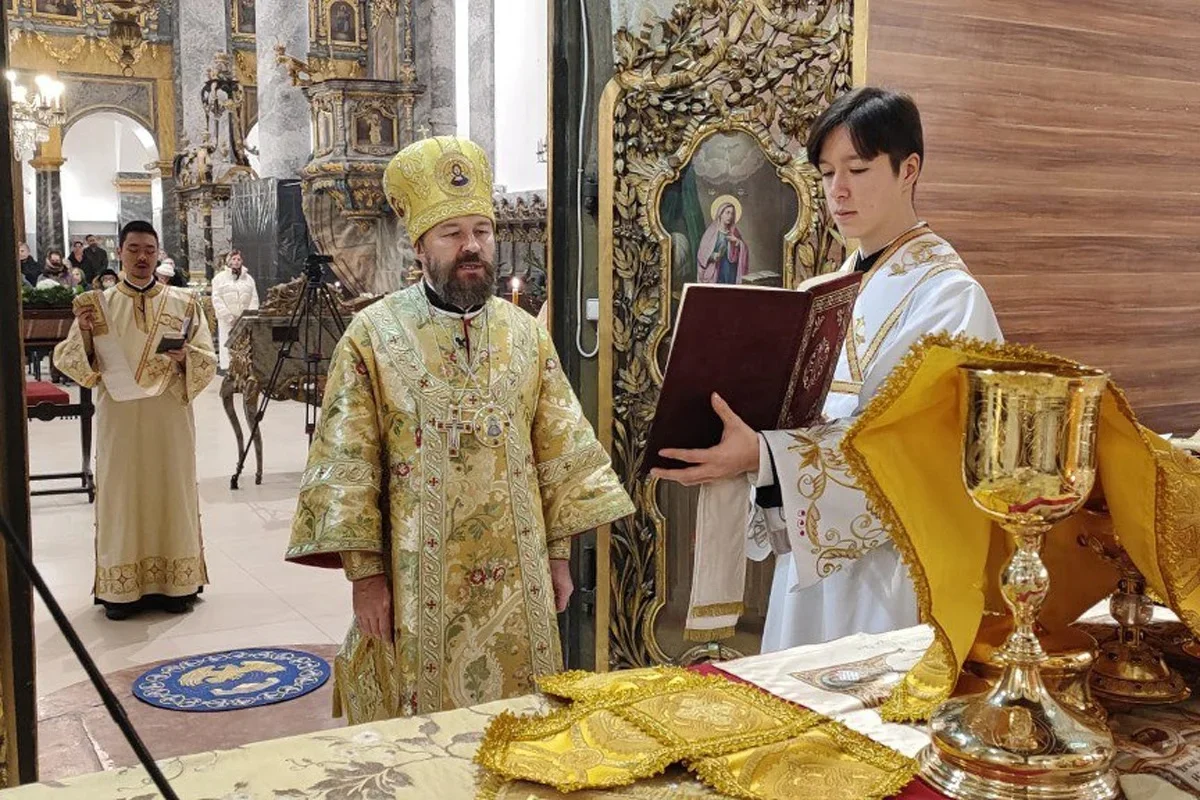
Hilarion and Suzuki together at mass in Hungary. Photo: Parish of the Holy Trinity – Novayagazeta.eu

Photo’s courtesy of George Suzuki – Novayagazeta.eu
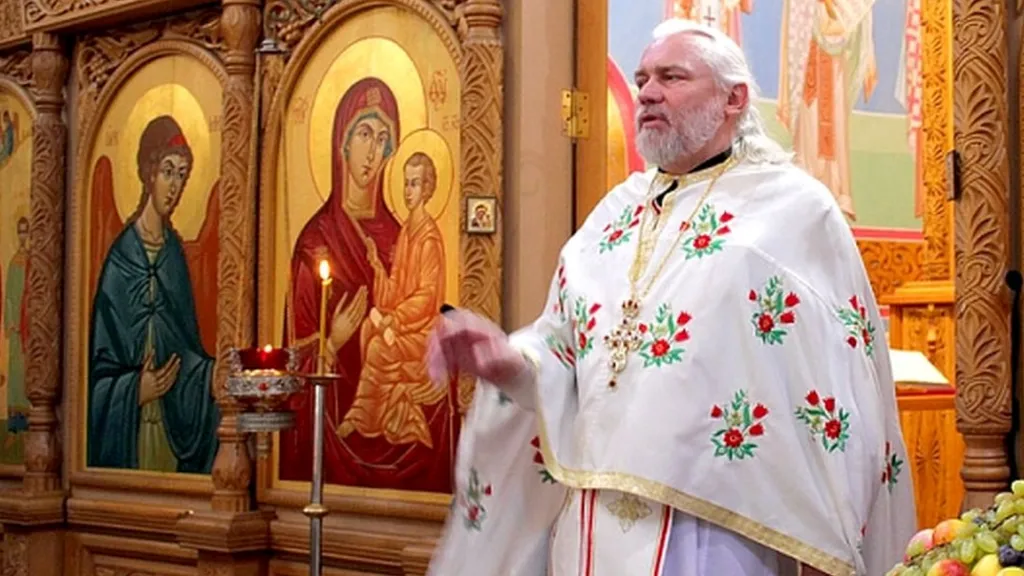
Sexual Abuse – Nikolai Stremsky was given a national honor for having Russia’s biggest family – BBC.com
These cases underscore systemic issues within religious and governmental institutions, highlighting the need for transparency, stringent oversight, and justice for victims.
10# The Khachaturyan sisters – Killing a Phallocrat
Published 18 January 2025
Sources: [50], [51], [52], [53], [54], [55]
Summary:
The tragic case of the Khachaturyan sisters has shed light on critical issues of domestic violence, societal neglect, and the failings of the Russian legal and social systems in addressing such abuses. The sisters’ actions, driven by years of abuse at the hands of their father, Mikhail Khachaturyan, have sparked a national debate about the adequacy of protections for victims of domestic violence in Russia. While some view the sisters as victims forced into extreme actions for self-defense, others see them as criminals, illustrating the deep polarization in Russian society on this issue.
The case also highlights the paradox of traditional family values, as championed by figures like Mikhail Khachaturyan, and the reality of their enforcement within a patriarchal framework that often tolerates abuse. Khachaturyan’s ties to the Russian Orthodox Church, alongside his violent behavior, raise questions about the role of religious and cultural institutions in perpetuating harmful gender dynamics.
This duality underscores the need for a reevaluation of the way traditional values are promoted and practiced, particularly when they mask or justify violence. The Khachaturyan sisters’ ordeal reveals a systemic failure to protect vulnerable individuals from abuse within the home and points to the urgent need for comprehensive legal and societal reforms.
The case has prompted growing calls for legislative change to better support victims of domestic violence, offering hope that future generations may live in a society where justice and protection for the abused are prioritized. It is essential that the Russian government, as well as societal and religious institutions, confront these challenges head-on to ensure that no victim is left without recourse and that the cycle of violence is broken for good.

The Killing of a Phallocrat – Mikhail Khachaturyan, Mafia Connections and Orthodoxy
11# Seeking Justice for the Victims
Published 20 January 2025
Sources: [15], [22], [29], [30], [31]
Summary:
The allegations of kidnapping, sexual abuse, and exploitation of children within the Russian Orthodox Church are part of a disturbing global pattern of abuse within religious institutions, highlighting a profound misuse of spiritual authority. Survivors of such abuse are bravely stepping forward to seek justice, revealing the harsh realities often concealed under the guise of «religious care» and «traditional family values». Their courageous voices are calling for accountability, shedding light on the lasting harm inflicted on vulnerable populations.
In Belarus, the rise in reported sex crimes, particularly involving pedophilia and child exploitation, underscores the challenges victims face when seeking justice. The immense power and influence wielded by religious institutions and their political and cultural entanglements create significant barriers to accountability, shielding perpetrators from scrutiny. The case of figures such as Andrei Lemeshonok, further illustrates the difficulty of confronting abuse within protected environments like St. Elisabeth Convent in Minsk.

Metropolitan Hilarion Suspended on Charges of Sexual Harassment
However, as international attention on these abuses continues to grow, there is an emerging hope that systemic change is possible. The increasing number of survivors coming forward and the growing awareness of these issues provide a glimmer of optimism that lasting reforms may be within reach. With continued advocacy and support, the pursuit of justice can foster a more protective environment for future generations, ensuring that religious institutions are held accountable for their actions and are true to their commitments to justice, compassion, and the well-being of those in their care.
Conclusion – A clear Pattern
The case of Andrei Lemeshonok and the St. Elisabeth Convent underscores how religious authority can be misused to shield misconduct. A pattern of alleged abuses has emerged, suggesting cover-ups, deceit, indoctrination, and violations under the guise of «traditional family values». Allegations of child abduction, exploitation, and abuse have profoundly disturbed the Belarusian community, leading to widespread calls for accountability and transparency within religious institutions.
The situation raises a pressing question: What, or whom, are Lemeshonok and his sect members trying to protect from scrutiny? Are they hiding their own actions or those of individuals beyond the convent’s walls?
The case of Andrei Lemeshonok has spurred public debate over the abuse of spiritual power and the urgent need for justice. The bravery of survivors stepping forward highlights a resolve to ensure that no one is beyond the reach of the law, reinforcing the principle that influence and authority do not grant impunity.
As the truth comes to light, there is the potential for Andrei Lemeshonok to face prosecution. His alleged crimes could lead him to the International Criminal Court (ICC) in The Hague, joining others who have faced consequences for human rights abuses.
Recently, twelve human rights organizations jointly signed an open letter to the member states of the «International Criminal Court (ICC)», urging them to support an appeal for an investigation into alleged crimes committed by the regime of Alexander Lukashenka.
The power of a united community remains unmatched; together, people can challenge any system of oppression. As history shows, the unity and will of the people are forces that no cleric, no tyrant, can indefinitely suppress.
Author:
Leon (Nic. Cheropoulos)
2024.12.06

